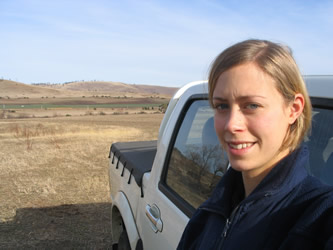|
How inspired you to do science?
I'm not sure where it all began�or how I even got to where I am now�but like all inquisitive kids, the question of "why" and the pursuit to find the answer (often leading to injuries of annoying brothers, or weird and wonderful concoctions in the kitchen), may have had something to do with it!
I've always been interested in understanding why things happen, or why things are the way they are. So science seemed the natural avenue to discover the answers I was looking for. I studied science throughout high school and college, and had very inspiring teachers, which helped stimulate my interest. Science was fun! And I enjoyed the challenge and satisfaction it gave me when I finally understood what was going on. But I couldn't really picture myself being a scientist for the rest of life. I was looking for a career that would allow me to diversify easily, that had a mixture of indoor and outdoor activities, involved people and making a difference in their everyday-lives. At that stage, becoming a scientist spelt white lab coat, microscope, test-tubes and a nerdy, lab constrained lifestyle! So I stuck with Plan A: to become an architect and design and manage my own restaurant come jazz bar!
 How did you become an agricultural scientist? How did you become an agricultural scientist?
One day, almost by accident, I found out that the Agricultural Department was holding an information session in the library during lunch. Being curious as I was, I decided to discover what it was all about. It was eye-opening! I'd never really considered how important science is to our primary industries and in turn how important agriculture is to people's livelihoods and Tasmania's economy. More to the point, I always thought agricultural science was about becoming a farmer, and coming from a city-slicker background, I didn't think it would really suit my lifestyle, especially considering I hated getting my hands dirty (things have changed a bit)! As I found out, ag science offered careers not just in farm management, but consultancy, research, teaching and policy-making. So from that day I signed up for the Industry Placement Program, which included a 5-day camp travelling around Tasmania looking at the major industries and a weeks work experience. This I did at the Tasmanian Institute of Agricultural Research's Newtown laboratories, looking at the anatomy of wine grapes, inspecting apples for codling moth and learning about biological measures for controlling weeds such as gorse and ragwort. It was a major deciding point for me�and as a result I enrolled in a degree in Agricultural Science at the University of Tasmania.
What are you doing now?
And here I am�in my last year at university, doing an Honours proejct on the effect of grazing on the growth and development of wheat for dual-purpose production. The process has been very challenging and at times very frustrating - one question always seems to lead to another question! But finally I've got the skills and level of knowledge to start coming up with my own hypotheses and working out the best methods to test them, and by the end of the year, hopefully I'll have a complete story, or at least the next stepping-stone.
What will you do when you complete your degree?
A holiday! And then I'm considering a career in systems modelling�or perhaps viticulture�or maybe even the dairy industry! The list is endless and very diverse, which is what makes ag. science exciting. What I'm most looking forward to is getting out and working in the industry - meeting new people, learning how each production system works, and coming up with solutions to limitations and problems, using science as the tool to discover the answers. One of my aims is to be able to extend science knowledge to the practical farm situation, and in the process assist farmers to improve productivity and profits to the benefit of their livelihood and the Australian economy, along with environmental sustainability.
|
|
